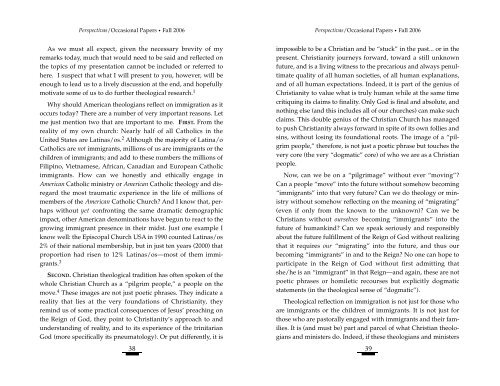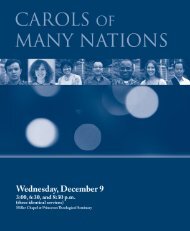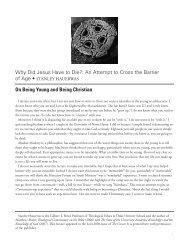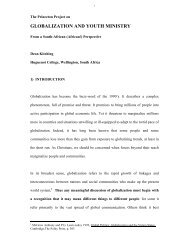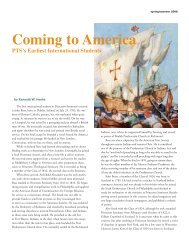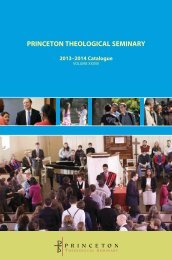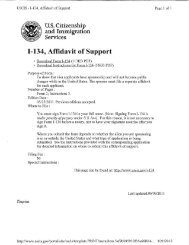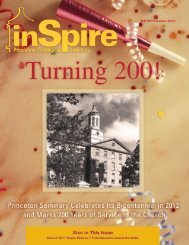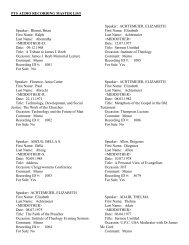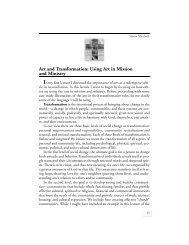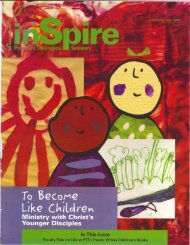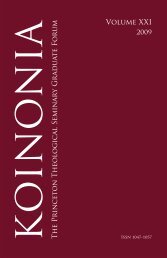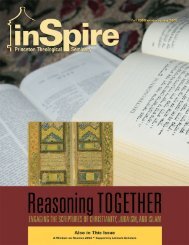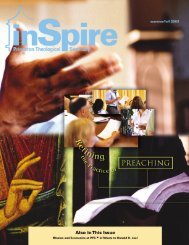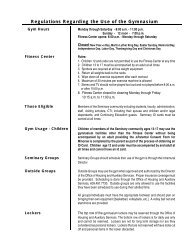P E R S P E C T I VAS - Princeton Theological Seminary
P E R S P E C T I VAS - Princeton Theological Seminary
P E R S P E C T I VAS - Princeton Theological Seminary
You also want an ePaper? Increase the reach of your titles
YUMPU automatically turns print PDFs into web optimized ePapers that Google loves.
Perspectivas/Occasional Papers • Fall 2006Perspectivas/Occasional Papers • Fall 2006As we must all expect, given the necessary brevity of myremarks today, much that would need to be said and reflected onthe topics of my presentation cannot be included or referred tohere. I suspect that what I will present to you, however, will beenough to lead us to a lively discussion at the end, and hopefullymotivate some of us to do further theological research. 1Why should American theologians reflect on immigration as itoccurs today? There are a number of very important reasons. Letme just mention two that are important to me. FIRST. From thereality of my own church: Nearly half of all Catholics in theUnited States are Latinas/os. 2 Although the majority of Latina/oCatholics are not immigrants, millions of us are immigrants or thechildren of immigrants; and add to these numbers the millions ofFilipino, Vietnamese, African, Canadian and European Catholicimmigrants. How can we honestly and ethically engage inAmerican Catholic ministry or American Catholic theology and disregardthe most traumatic experience in the life of millions ofmembers of the American Catholic Church? And I know that, perhapswithout yet confronting the same dramatic demographicimpact, other American denominations have begun to react to thegrowing immigrant presence in their midst. Just one example Iknow well: the Episcopal Church USA in 1990 counted Latinas/os2% of their national membership, but in just ten years (2000) thatproportion had risen to 12% Latinas/os—most of them immigrants.3SECOND. Christian theological tradition has often spoken of thewhole Christian Church as a “pilgrim people,” a people on themove. 4 These images are not just poetic phrases. They indicate areality that lies at the very foundations of Christianity, theyremind us of some practical consequences of Jesus’ preaching onthe Reign of God, they point to Christianity’s approach to andunderstanding of reality, and to its experience of the trinitarianGod (more specifically its pneumatology). Or put differently, it is38impossible to be a Christian and be “stuck” in the past... or in thepresent. Christianity journeys forward, toward a still unknownfuture, and is a living witness to the precarious and always penultimatequality of all human societies, of all human explanations,and of all human expectations. Indeed, it is part of the genius ofChristianity to value what is truly human while at the same timecritiquing its claims to finality. Only God is final and absolute, andnothing else (and this includes all of our churches) can make suchclaims. This double genius of the Christian Church has managedto push Christianity always forward in spite of its own follies andsins, without losing its foundational roots. The image of a “pilgrimpeople,” therefore, is not just a poetic phrase but touches thevery core (the very “dogmatic” core) of who we are as a Christianpeople.Now, can we be on a “pilgrimage” without ever “moving”?Can a people “move” into the future without somehow becoming“immigrants” into that very future? Can we do theology or ministrywithout somehow reflecting on the meaning of “migrating”(even if only from the known to the unknown)? Can we beChristians without ourselves becoming “immigrants” into thefuture of humankind? Can we speak seriously and responsiblyabout the future fulfillment of the Reign of God without realizingthat it requires our “migrating” into the future, and thus ourbecoming “immigrants” in and to the Reign? No one can hope toparticipate in the Reign of God without first admitting thatshe/he is an “immigrant” in that Reign—and again, these are notpoetic phrases or homiletic recourses but explicitly dogmaticstatements (in the theological sense of “dogmatic”).<strong>Theological</strong> reflection on immigration is not just for those whoare immigrants or the children of immigrants. It is not just forthose who are pastorally engaged with immigrants and their families.It is (and must be) part and parcel of what Christian theologiansand ministers do. Indeed, if these theologians and ministers39


